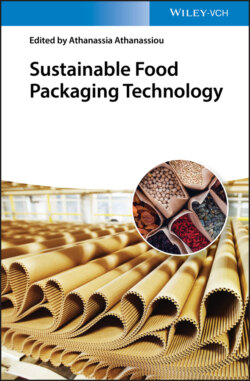Читать книгу Sustainable Food Packaging Technology - Группа авторов - Страница 18
1.3.3 Poly(butylene adipate‐co‐terephthalate)
ОглавлениеPoly(butylene adipate‐co‐terephtalate) (PBAT) is a biodegradable aliphatic–aromatic copolymer, synthetized by the reactions of the monomer 1,4‐butanediol, adipic acid, and terephthalic acid. It is biocompatible and biodegradable, being degraded in a few weeks by lipases from Pseudomonas cepacia and Candida cylindracea [43]. Also, it is highly amorphous, it has high ductility and thermomechanical properties comparable with LDPE, and is compostable [44, 45]. Despite these suitable characteristics, PBAT shows a high permeability to water, that is, a poor water barrier property, and fails to achieve the mechanical strength required for some applications [46]. Different approaches have been considered to overcome these disadvantages, such as surface modifications, use of polymer blends, and reinforcement by fillers [47]. For instance, blends of PBAT with PLA can result in a biodegradable article with balanced mechanical properties, though the use of a chain extender or a cross‐linking agent to enhance the interfacial adhesion is usually necessary [48]. Also, the use of nanocomposites based on PBAT and layered silicates have yielded materials with improved mechanical properties [49].
PBAT films can be prepared using cast film extrusion, blown film extrusion, thermo‐compression, and solvent casting methods [50] and they can be used for agriculture, food packaging, waste and compost bags, among others [51]. PBAT is sold commercially by the trade names of Ecoflex® by BASF (Ludwigshafen, Germany), Easter Bio® from Eastman Chemical (Kingsport, USA), and Origo‐Bi® from Novamont (Novara, Italy). It is allowed for food packaging applications by the FDA [52, 53] and the incorporation of antimicrobial substances for active food packaging has recently shown very promising results to enhance food safety [54].
